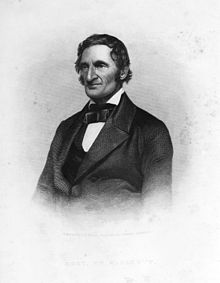William Alcott
Appearance

William Andrus Alcott (August 6, 1798 – March 29, 1859), also known as William Alexander Alcott, was an American educator, educational reformer, physician, and author of 108 books. His works, which include a wide range of topics including educational reform, physical education, school house design, family life, and diet, are still widely cited today.
| This article on an author is a stub. You can help out with Wikiquote by expanding it! |
Quotes
[edit]Vegetable Diet (1838)
[edit]- Vegetable Diet: As Sanctioned by Medical Men, and by Experience in All Ages, Boston: Marsh, Capen & Lyon, 1838.
- None, so far as I know, will affirm, or at least with any show of reason maintain, that anatomy, so far as that goes, is in favor of flesh-eating.
- p. 225
- If perfect health is the best preventive and security against disease, and if a well-selected and properly administered vegetable diet is best calculated to promote and preserve that perfect health, then this part of the subject — what I have ventured to call the medical argument — is at once disposed of. The superiority of the diet I recommend is established beyond the possibility of debate. Now, that this is the case — namely, that this diet is best calculated to promote perfect health — I have no doubt.
- p. 240
- Political economists tell us that the produce of an acre of land in wheat, corn, potatoes, and other vegetables, and in fruits, will sustain animal life sixteen times as long as when the produce of the same acre is converted into flesh, by feeding and fattening animals upon it.
- p. 252
- The destruction of animals for food, in its details and tendencies, involves so much of cruelty as to cause every reflecting individual — not destitute of the ordinary sensibilities of our nature — to shudder.
- p. 267
- The world, I mean our own portion of it, sometimes seems to me like one mighty slaughter-house — one grand school for the suppression of every kind and tender and brotherly feeling — one grand process of education to the entire destitution of all moral principle — one vast scene of destruction to all moral sensibility, and all sympathy with the woes of those around us. Is it not so?
- p. 268
- No child, I think, can walk through a common market or slaughter-house without receiving moral injury; nor am I quite sure that any virtuous adult can.
- pp. 270-271

